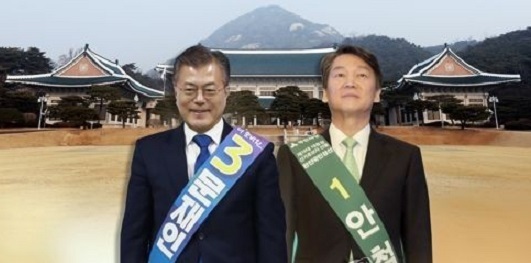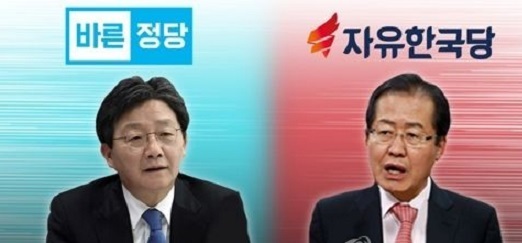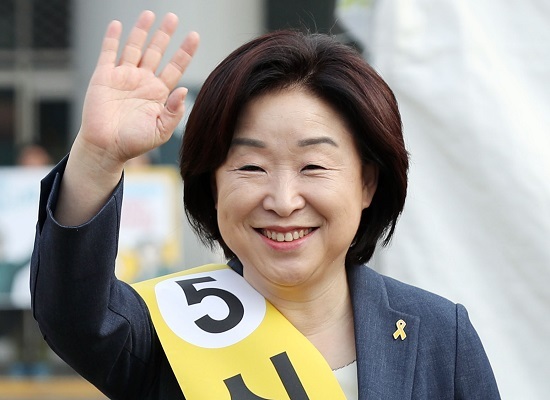South Korea's security alliance with the United States is emerging as a prominent issue for the upcoming election, with Pyongyang ratcheting up cross-border tensions with its unrelenting saber-rattling.
Major presidential candidates -- except for a far-left one -- have stressed the need to firm up the defense partnership, but the varying degrees of their support for it are expected to affect voter sentiment in the lead-up to the May 9 poll, observers said.
The election, triggered by the March 10 ouster of scandal-hit former President Park Geun-hye, will come as the alliance faces a series of daunting tasks, such as policy coordination on Pyongyang's denuclearization and Washington's envisioned handover of wartime operational control.
The alliance will also encounter a tricky challenge as Seoul seeks a delicate geostrategic balance between its security ally and China, its largest trading partner -- a point that calls for prudent diplomacy from the next South Korean leader, experts said.
"The election race comes at a critical point for the Seoul-Washington alliance, given that depending on the new South Korean president's policy stance, there will be a readjustment -- if not a fundamental change -- in the direction of the bilateral partnership," said Nam Chang-hee, an international politics professor at Inha University.
 |
This image, provided by Yonhap News TV, shows Moon Jae-in (L) and Ahn Cheol-soo, the presidential candidates of the liberal Democratic Party and the center-left People's Party, respectively. (Yonhap) |
The election competition is increasingly seen as a two-way race between front-runner Moon Jae-in of the liberal Democratic Party and runner-up Ahn Cheol-soo of the center-left People's Party, with their combined support ratings reaching nearly 80 percent.
Other contenders include Hong Joon-pyo of the conservative Liberty Korea Party, Yoo Seong-min of the splinter right-wing Bareun Party and Sim Sang-jeung of the far-left Justice Party. The election is seen as more favorable to the liberal bloc in the wake of a massive corruption scandal involving Park and her longtime confidante.
Moon has said that to address the decades-long nuclear standoff with Pyongyang, he would strengthen the alliance with Washington and deepen cooperation with neighboring countries such as China, Japan and Russia.
However, the front-runner said in his book, published earlier this year, that though he is supportive of the US, Seoul should learn to say "no" to American demands, an apparent criticism of Seoul's diplomacy that is highly dependent on Washington.
Moon served as a chief of staff to former President Roh Moo-hyun, who was elected in 2003 after riding anti-American sentiment triggered by the deaths of two girls run over by a US military vehicle during an exercise here in 2002.
Roh sought a "fairer, balanced" relationship with the US based on his controversial vision of South Korea becoming a "balancer" in Northeast Asia. The ill-fated vision triggered speculation in Washington that Seoul would remain "neutral" between Washington and Beijing.
Moon's stance on the ongoing installation of a Terminal High-Altitude Area Defense system, a core US anti-missile asset, on the peninsula, had been seen as a source of contention with Washington, until recently when he apparently readjusted his stance on the deployment.
Moon initially said that the deployment had to be delayed for the next government to decide on it. But after Pyongyang's recent missile launches, Moon warned that THAAD would be inevitable should Pyongyang stage another nuclear test or major provocations.
Ahn, the centrist presidential aspirant, has appeared stronger in his support for the alliance, as he pledged to beef up the country's independent military power with "the alliance forming its foundation."
On the THAAD issue, Ahn has remained positive, saying Seoul cannot unilaterally alter the bilateral agreement on the deployment.
But the stance of his party, led by Park Jie-won, a liberal political bigwig, has been seen as a potential hurdle to the bilateral alliance. The party as a whole has opposed the THAAD deployment.
Ahn's party chief Park served as a chief of staff to former liberal President Kim Dae-jung whose soft-line stance on the communist regime and unconditional largess to it once triggered a conflict with the US government. Kim served as president from 1998-2003.
 |
This image shows Hong Joon-pyo (R) and Yoo Seong-min, the presidential candidates of the conservative Liberty Korea Party and the splinter Bareun Party. (Yonhap) |
Conservative candidates Hong and Yoo have similar positions on the alliance.
Flaunting security skills as their forte, both have characterized the alliance as a life-or-death issue, vowing to further enhance security cooperation with Washington.
But Hong's aggressive security stance could cause friction in the alliance, analysts said.
Hong has called for the redeployment of American tactical nuclear weapons to the South, which were withdrawn from the peninsula after the two Koreas declared a joint statement on denuclearization in 1991.
Observers said the redeployment could undermine Washington's longstanding global non-proliferation drive, while others raise the possibility that Hong's stance appears intended to secure more security commitments from the ally.
 |
Sim Sang-jeung, the presidential candidate of the far-left Justice Party, waves to citizens on her campaign trail in Incheon, west of Seoul, on April 18, 2017. (Yonhap) |
Sim of the Justice Party has consistently opposed the THAAD deployment, a stance likely to cause tensions with Washington.
In a recent TV debate, Sim has also shown his desire for the resumption of dialogue with Pyongyang through a "comprehensive deal" based on a freeze on the North's nuclear program and the suspension of South Korea-US military drills. (Yonhap)










![[Today’s K-pop] Blackpink’s Jennie, Lisa invited to Coachella as solo acts](http://res.heraldm.com/phpwas/restmb_idxmake.php?idx=644&simg=/content/image/2024/11/21/20241121050099_0.jpg)